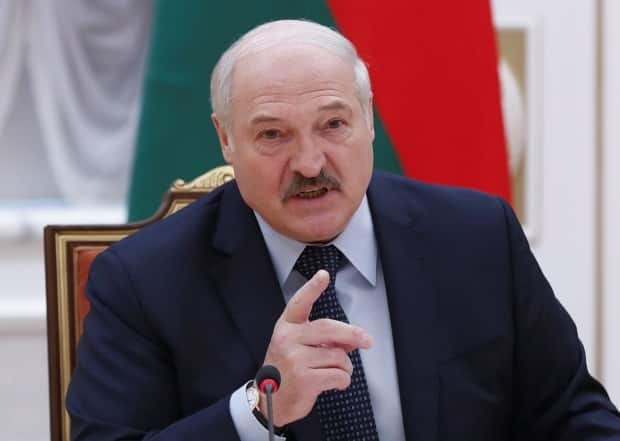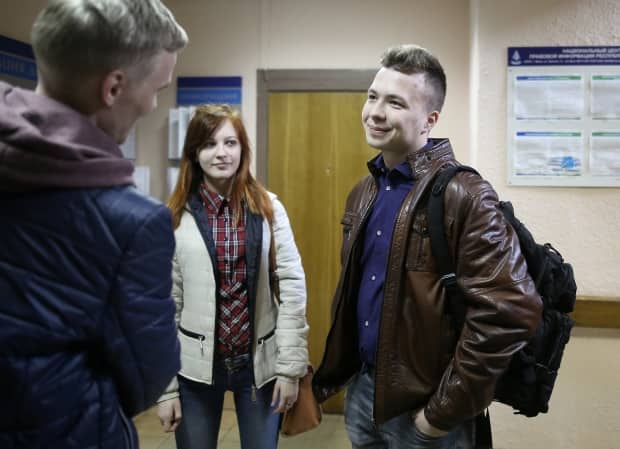It's time to bleed Belarus's economy, says former Lukashenko adviser

From his vantage next door in Poland, Anatol Kotau looks at his homeland, Belarus, and sees a country on the precipice of collapse.
The Belarusian government's decision to concoct a fake bomb threat and force a Ryanair jet to divert and land in order to arrest a foe of the regime has ignited global outrage. It has also further isolated President Alexander Lukashenko.
Even so, Kotau says the events of this tumultuous week make it no easier to predict when the end of Lukashenko's 27-year rule may come.
"It's really fascism, Stalinism and Orwell 1984, all at the same time," Kotau said of Belarus's government, in which he served loyally for 15 years.
It was the presidential election of 2020 that finally broke him.
In the aftermath of the elections, which independent observers and Western states said were marred by intimidation tactics, detention of opposition candidates and a lack of transparency, people took to the streets of Minsk and other cities by the tens of thousands, weekend after weekend, well into the winter.
"The main reason [I left] was brutality and violence in the streets," Kotau told CBC from his refuge in Warsaw.

"In August 2020, after completely rigged elections, our authorities tried to force people [to believe] that the election campaign was democratic and transparent.
"Minsk was turned into a battleground, and this was too much for me."
Battleground Belarus
Kotau is part of an extremely rare club of senior Lukashenko officials who abandoned the regime and switched to the opposition.
He spent his entire career in Belarus's public service — all of it during Lukashenko's tenure — and worked his way through senior roles in the country's foreign ministry, Olympic committee and finally the president's administration office, which reports directly to Lukashenko.
Despite that, Kotau said he rarely had direct contact with the leader himself.
This week, the country's almost year-long political crisis flared up again with the Belarusian operation that dispatched a MIG fighter jet to ensure a Ryanair plane from Athens diverted to Minsk instead of landing at its destination in Lithuania.

Once the plane was on the ground, the secret police, or KGB — in Belarus, it never changed its name from Soviet times — removed and arrested 26-year-old journalist Roman Protasevich.
Like so many other Lukashenko opponents, Protasevich had fled the country and was living in exile, where he operated a social media site that publicized anti-Lukashenko activities.

Soon after his detention, Protasevich appeared in what friends are calling a "hostage video." They suspected he had been beaten and coerced into admitting he broke the law by promoting illegal protests. Protasevich's girlfriend, a 23-year-old Russian national named Sofia Sapega, is also being held by Belarusian police.
WATCH | Protasevich says he's co-operating with authorities in video friends suspect was coerced:
Increasing economic sanctions
Kotau has become part of what Belarus's opposition calls the "National Anti-Crisis Management" team, and he is using his experience working with Western organizations and governments to try to forge stronger ties between anti-Lukashenko forces and the rest of the world.
He says he's encouraged by the early response of the European Union to ban Belarus's national air carrier, Belavia, from many countries and to stop EU air carriers from flying through Belarusian airspace.
But Kotau says Europe and other nations must also target Belarus's key export industries — oil products, fertilizers and potash — to intensify the pressure on Lukashenko.
EU officials said Thursday that they are working on a package of economic sanctions, but haven't yet announced them.
"Lukashenko's economy cannot survive without external finance, and cutting off the sources of income will shorten his days," said Kotau. "He will not be able to pay salaries for the majority of Belarusians … and these people will go to the streets."
Kotau cites a Belarusian saying, "The refrigerator will vote," which suggests that only when people can no longer afford basic necessities will Lukashenko's iron-fisted hold on power be shaken.
WATCH | Parents of jailed Belarusian journalist plead for help:
Ryanair diversion reignites opposition
Before the Ryanair incident, the drive to force Lukashenko out of power appeared to be stalling. With most key opposition leaders either in jail or in exile, protests had evaporated and repression from security services had intensified.
In the previous month alone, Britain's Daily Telegraph reported there were more than 200 arrests resulting in thousands of days of jail time, often for trivial offences such as wearing the red and white colours of the opposition on shoes or gloves.

Since the beginning of the protest movement, more than 35,000 people have been arrested, with thousands handed jail terms.
Tragically, some, including 50-year-old Vitold Ashurak, have died in mysterious circumstances not long into their sentences. Ashurak's body was delivered to his family this week, five months after he was sentenced to five years in jail. The authorities claim he died of a heart attack, but his family has said he had no health issues before his arrest.
Demanding loyalty
Human Rights Watch says Belarusian police routinely degrade and torture political prisoners.
Kotau says Lukashenko's KGB have also been able to coerce employees at the state-owned enterprises that dominate Belarus's economy to remain loyal, prolonging his hold on power.
Defections from the higher levels of the government are extremely rare.
"The system tries to frighten everyone to stay within the system and keep silent," Kotau said.
"Now it's impossible [for a civil servant] to get a nomination for a higher post if there is no package of kompromat," he said, a reference to efforts by the secret police to blackmail people by revealing embarrassing details of their personal life.
"The system nominates people with problems, and that's why they cannot quit the system, as the system will prosecute them."
Putin's role
Before the political unrest, Russia was already Belarus's largest trading partner, accounting for almost 50 per cent of its international trade. In the months since, Russia's importance has only grown, with President Vladimir Putin lending Lukashenko's regime political and economic support.
The Kremlin even dispatched teams of "journalists" from the state-run RT network to Minsk to adapt Russian propaganda techniques when Belarusian media workers walked off the job.

Putin sees Belarus as a buffer between Russia and Europe and fears a Ukraine-type scenario, where mass protests in 2014 overthrew a pro-Russian government, says Nigel Gould-Davies, a former British ambassador to Belarus.
"Russia is looking to exploit Lukashenko's isolation from the West to try to pursue a longer-term agenda of their own — by extending de facto dominance over Belarus," Gould-Davies told CBC News in an interview shortly after the Ryanair incident.
Personally, Lukashenko and Putin appear to have an uneasy relationship. Their awkward body language at joint news conferences suggests they have little enthusiasm for each other.
This week, official Kremlin statements on Protasevich's arrest have been muted. Russian state TV has refrained from praising Lukashenko for the so-called hijacking and has instead focused its criticisms on the response from the West.
Gould-Davies said the distrust between the two leaders comes down to the fact that "Putin always wants more."
"He doesn't just want Belarus to be an anti-Western bastion on Russia's doorstep; he wants to extend control over Belarus, over Lukashenko, and to gain control over key economic assets."
High economic price
Lukashenko, on the other hand, wants to avoid becoming Putin's puppet.
On Friday, the pair met at the Russian city of Sochi, on the Black Sea, a meeting that had been set prior to last Sunday's incident.
In brief comments, Putin said Western outrage over the jet incident isn't genuine.
When the pair met in Sochi in September 2020, Lukashenko left with a promise of more than a billion dollars US in loans from Russia.
Kotau says Russia may have little choice but to keep funnelling money his way.
The economic price "of hijacking the plane is extremely high," said Kotau, estimating that in a worst-case scenario, European sanctions could cost Belarus's economy between $5 billion and $15 billion annually.
Lukashenko, meanwhile, appears determined to remind Russia that the fates of the two countries are intertwined.
In a speech this week to Belarus's parliament, Lukashenko said, "We are as valuable to Russia as Russia is to us."
